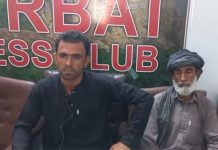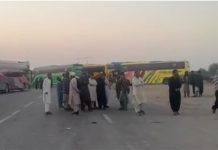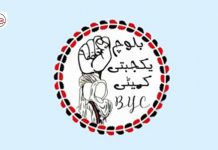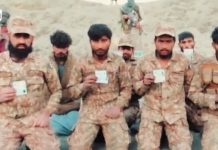Life demands struggle. Selfish people are indifferent to the true values of life. The most beautiful people are those who have understood suffering, perceived circumstances, known loss, and found their way out of the depths. The path is one of struggle, which teaches you many things. Struggle is part of the nature of life. Human beings have practically always taken the route of struggle to reach greater heights. Those who follow their ideology till their last breath are the great ones.
The memories of those who struggle for a great cause become part of history. Especially the memories of those who have spent their entire lives consistently fighting for an ideology. The fact is that in revolutionary movements, everyone has their own role; no person is important, but the achievements are. Each individual contributes their share to the movement according to their capacity. However, history needs to be seen from the perspective of ordinary people, rather than through the eyes of rulers, generals, great leaders, and social or cultural elites.
The memories of Comrade Gulab’s struggle are part of history. Comrade Gulab Baloch was born on August 8, 1969, in Karachi. His father’s name was Muhammad Pasand Noori, and his mother’s name was Zainab. His ancestral village was Chakli Kalanch, Balochistan. Most of the people of Chakli Kalanch make their living by herding livestock and farming during the rainy season. Comrade Gulab was highly educated, holding master’s degrees in Economics and Political Science. He had an immense love for reading.
He wrote numerous articles on the Baloch, Balochistan, and the Baloch national movement and history. A book titled “The Baloch National Question” was also published by him. Besides writing under the name “Sangat Burhan Zai,” he used other pseudonyms to raise awareness among Baloch youth. Even in severe illness, he persisted in organizing and publishing his writings. Unfortunately, life didn’t give him enough time, and he passed away on October 15, 2023. This interview was conducted during Comrade Gulab’s illness.
There were still many questions left unanswered, and he left us. There were many aspects of Comrade Gulab’s analyses and experiences that we had yet to discuss, but his ill health and departure have left us with an incomplete interview.
Despite immense physical pain and suffering, Comrade Gulab remained ideologically steadfast, hopeful, enthusiastic, and tried to continue his intellectual and practical journey as much as he could. Our conversation with Comrade Gulab was meant to be long and profound, but fate had other plans.
Comrade Gulab always kept a keen eye on Baloch politics and the national struggle. In many of his writings, under his pen name Meerak Baloch, he spoke about transforming the Baloch struggle into a conventional war.
Surely, wherever Comrade Gulab is today, he must be looking at the new dimensions of the Baloch national struggle with greater hope, and his belief must have grown stronger that no force can now stop the Baloch from resolving their national question.
The following interview is a conversation with a kind friend, leader, intellectual, and comrade that is crucial to reach to the Baloch nation.
Question: Where were you born, and where did you receive your early education?
Answer: I was born in Karachi and received my early education there as well.
Question: Where did your political journey begin?
Answer: I had a passion for reading from childhood, which sparked my political curiosity. I was naturally sensitive; seeing poverty or oppression troubled me deeply, but without awareness, I didn’t understand why these things were happening in society.
My political journey began through my close association with Dr. Zafar Baloch, one of the active leaders of the Communist Party of Pakistan. He was also serving as a key figure in the student organization. I met him through his younger brother, Maqbool. Maqbool and I were classmates at Ibrahim Ali Bhai School, and we, along with other children, took tuition from Zafar Bhai. From there, Maqbool and I, along with other kids, joined “Saathi Bara Sangat,” which was a children’s organization of the Communist Party of Pakistan, though we didn’t realize it at the time. My first conscious involvement was with DSF (Democratic Students Federation), which was the Communist Party’s student wing, and Dr. Zafar Baloch guided us. His younger brother, Masood Baloch, was very active in this organization. Through Masood, we attended protests, conferences, and meetings.
Question: What was DSF’s or the Communist Party’s stance on the national question?
Answer: As a Baloch, I and some of my friends felt that DSF or the Communist Party didn’t have a clear policy on the national question. Instead, they linked the national question to the class question. My friends and I submitted written documents to Azhar Abbas, the chairman of DSF Karachi Zone, after which a debate started within DSF. Senior comrades met with us, but they couldn’t convince us. Later, Comrade Afshan Subuhi, our organization’s leader, introduced us to her father, Professor Jamal Naqvi, a leader of the Communist Party.
In our meeting, Professor Naqvi said clearly: “Look, we have struggled alongside Baloch leaders within the National Awami Party. Our comrades resisted the military operation in Balochistan in 1973, faced imprisonment, and went into exile. We fully recognize the Baloch national question. However, unless oppressed classes and nations struggle together, they won’t reach their goals. Bangladesh is a clear example; despite gaining independence, it remains under the grip of its ruling class. We are part of the global revolutionary and workers’ movements. No nation can achieve true freedom in isolation. Your concerns are valid, but we must connect the national question with the class struggle to achieve real freedom.”
Question: Did you and your friends agree with the Communist Party of Pakistan’s policy on the national question?
Answer: Not at all. The reason is that Balochistan was an independent country with its own unique status, and it even had an embassy in Karachi. Pakistan forcibly occupied Balochistan on March 27, 1948, so Balochistan’s status was entirely different from other provinces of Pakistan. Moreover, a national liberation movement started there in which all sections of the Baloch fought together, including tribal leaders and nawabs. The Baloch national question has historical significance. Sadly, progressive forces in Pakistan either failed to support or hypocritically ignored the beautiful Baloch movement.
Question: What were the reasons for the split of the Pakistan Communist Party and its student organization?
Answer: Since we were working in the student organization of the Communist Party, DSF, the disintegration of the Communist Party resulted not only in the split of the DSF but also affected other subordinate organizations like the Sindh Hari Committee, the Progressive Writers’ Association, the Democratic Women’s Association, and others. Some of us from the DSF joined the Chandio group, while others joined Ali Hassan Chandio’s group. This process occurred during a time of polarization for progressives around the world following the collapse of the Soviet Union, which led to the breakdown of many socialist countries, such as the complete dissolution of Yugoslavia and the division of Czechoslovakia into two countries. After the fall of the Berlin Wall, East and West Germany unified. In such circumstances, what status could a weak organization like the Communist Party of Pakistan, which had no roots in the people, hold? Thus, the Communist movement in Pakistan became a thing of the past.
Question: After the collapse of the Soviet Union and the end of the Communist Party and its student organization in Pakistan, which political party did you affiliate with?
Answer: With the dissolution of the Communist Party and the DSF, the Baloch national movement also split into two parts; the BSO was also divided. Hence, it was a time of great turmoil for political activists like us. However, we desired a single mass party for the Baloch that could reassess the Baloch national movement and restart the struggle. However, an opportunist group emerged in Balochistan, leading to a fragmentation of Baloch politics, and these opportunists adopted privileged parliamentary politics, leaving the Baloch nation helpless. During that time, we did not affiliate with any political party because we did not consider them real political parties due to their lack of ideological cohesion. During this period, I continued my education and also formed and worked in small literary organizations. However, there was no satisfaction. Our teacher, Dr. Zafar Baloch, joined the National Party during this time and offered us to join as well, but we declined. During this time, Zafar Bhai went to the United States for further studies.
Question: In the year 2000, the Baloch’s liberation movement resurfaced, and you, Dr. Zafar Baloch, and your other companions joined BNM. Was this a collective decision?
Answer: No, it was not a collective decision. Dr. Zafar Baloch went to Canada after completing his studies in the U.S., where he connected with Baloch exiled leaders. From there, he and other companions joined BNM. On the suggestion of one of my senior BNM leaders, Comrade Faraz Baloch, I met Shaheed Qaid Waja Ghulam Muhammad, where, in the presence of Comrade Faraz, I enthusiastically accepted the invitation of Shaheed Qaid Waja Ghulam Muhammad to join BNM. From then on, my relationship with the Shaheed Qaid deepened day by day. I felt that it was the fortune of the Baloch nation to have found a dignified, brave, and extremely loyal and sincere leader. The Shaheed Qaid was a shining star in the entire Baloch national freedom movement. No one could hold a candle to his charismatic personality. That is why the cunning generals of the state devised plans to remove him from the scene, and ultimately, they succeeded in their nefarious designs by martyred our great leader along with two of his companions in Mergap.
Question: You have written articles and analyses on Baloch movement, Baloch insurgency, and national directions under various pseudonyms, where fundamental questions have been highlighted effectively, and you have pointed out the correct directions in an intellectual manner. Is the analysis still ongoing?
Answer: I have never considered myself an intellectual, but as a political activist, I have tried to bring together my lifelong struggle and what I have learned and experienced to contribute to the Baloch national liberation movement, considering the international and regional conditions and observing them. Sometimes, discussions have taken place regarding possibilities, while at other times, I have emphasized the need for Baloch to strike back with greater intensity against the enemy. I have also critically examined the movement, emphasizing the need to determine the best directions. As a political activist, I firmly believe that the series of writings will not stop.
Question: Do Baloch intellectuals and writers appear to play their national role effectively concerning the ongoing Baloch national movement in Balochistan?
Answer: Sadly, I have to say that, apart from a few intellectuals and writers, the rest demonstrate extreme cowardice and hypocrisy. Some even poison the atmosphere in their private gatherings regarding the Baloch national movement and speak about its eradication. Yet, observe their duplicity; they celebrate a so-called culture day in universities and colleges under official patronage, which has nothing to do with the true culture of the Baloch people. It doesn’t take a rocket scientist to understand that language, literature, and culture are products of market dynamics and sovereignty. It is through them that language, literature, and culture progress. Meanwhile, the Baloch have neither a market nor sovereignty; then what kind of language, what kind of literature, and what kind of culture can there be?
This is why there is a flood of books and magazines from these so-called writers and intellectuals, but no one is studying them. Since the Baloch state is under the occupation of outsiders, and the occupiers are committing genocide against the Baloch nation, the Baloch people have been in a state of war for the last seven decades. If, today, the Baloch nation is facing genocide, and there is a threat to Baloch national identity and homeland, then if these intellectuals remain silent or show further indifference, their books will end up collecting dust in libraries or museums. Because when the nation is eradicated and the land ceases to exist, what value will language, literature, and culture have, and for whom will they matter? For instance, the Maya civilization belongs to the Akkadian and Sumerian peoples, whose languages are no longer spoken in this world.
Question: What possibilities do you see in the current Baloch national movement, which has been ongoing for about 21 years?
Answer: The current national movement is, in fact, a historical continuity. The Baloch national movement began after the forcible annexation on March 27, 1948. Although the initial movement was confined to Kalat and its surroundings, later its effects spread to all layers of Baloch society. Although this movement ended a few years later, that struggle became a continuation of the Baloch national movement. Between 1958 and 1960, Babu Noor Muhammad Khan and his fighters carried out a struggle that continued until his martyrdom in 1960. General Sherov then organized that continuity into a complete organizational form and initiated the insurgent movement, which became the vanguard role of the Marri tribes. This war continued from 1962 until the ceasefire in 1969, which was the acknowledgment of the Pakistani state that the Baloch national movement truly existed.
This ceasefire took the form of a formal agreement between the Pakistani state and Baloch insurgents, allowing Baloch leadership to participate in the 1970 elections under the National Awami Party’s platform, achieving success across Balochistan. However, as per tradition, the Pakistani state did not honor its commitments, and in 1973, the national liberation movement began with great vigor, marking the bloodiest conflict in comparison to all previous wars, which lasted from 1973 to 1977. After this war, the situation became clearer. The Baloch national movement continued to organize in a modern scientific manner, having profound effects on Baloch politics. It was here that the freedom fighters distinguished their opinions from the parliamentary-minded leaders. The leaders of the freedom fighters became Baba-e-Baloch, Nawab Khair Bakhsh Marri, while the parliamentary-oriented leader became Baba-e-Muzakirat, Mir Ghous Bakhsh Bizenjo.
I believe that the ceasefire of 1969 and participation in the 1970 elections was a mistake of our elders. The ongoing movement is a comprehensive national freedom movement, unlike previous movements that were solely tribal-based; it is now in the hands of educated, conscious youth leadership.
Another significant aspect and success of the recent movement is the clear and conscious participation of Baloch women. This movement has gained international recognition, and all layers of the Baloch are now part of it. Furthermore, the current movement has also selected its own practical, intellectual, and conscious writers.
Moreover, the current movement has unveiled the face of so-called nationalists, including the leadership of BNP Mengal and the National Party. The duplicity of BNP Mengal has been exposed by this movement; on one hand, they claim nationalism while, on the other, they are tied in affectionate relationships with expansionist China. A clear example of this is when, upon the death of Sardar Attaullah Mengal, the Chinese Communist Party officially expressed condolences to BNP Mengal, stating that the leadership of BNP Mengal had provided substantial cooperation and protection in the Chinese mega-project CPEC, for which China is grateful. Therefore, I am very hopeful about the current national movement because the Baloch nation has risen above tribal, regional, and gender divisions to consciously participate in the struggle for national freedom.
Question: If we look at the Baloch national movement from March 27, 1948, to the present, what mistakes do you believe Baloch leaders have made based on your observations?
Answer: I have identified many mistakes in my writing “The Baloch National Question,” but since humans make mistakes continuously, and societies also face errors, conscious people acknowledge their mistakes and learn from them to rectify them. The current ongoing national movement has learned a lot compared to the past. The mistakes made by our ancestors have largely been rectified by the current movement, although we have faced many losses and traumas. For instance, in the past, the movement was limited to tribes; our elders failed to expand the movement. Many prominent leaders were part of past movements, but they did not internationally recognize the national liberation movement nor did they seriously focus on important aspects like diplomacy or establishing stable institutions.
It cannot be ignored that Baloch leaders have always led their movement in a relatively progressive secular manner since the beginning, which is commendable. This is why the Baloch national movement has remained free from narrow-mindedness and extremism, and it is also true that the world supports and aids enlightened movements. However, despite all this, our elders were not successful in taking advantage for their movement and were sometimes indecisive. At times they spoke of the right to self-determination, sometimes autonomy, and at other times complete freedom, which failed to provide any direction to the movement, leading the Baloch nation to suffer tremendous losses.
One of the many mistakes of our elders was during the severe crisis that the Pakistani state faced in 1971, when the liberation of Balochistan was knocking at our doors. However, our leaders showed extreme lethargy and did not take advantage of that situation. The crisis of 1971 was so severe that Iran deployed its 300,000 troops on the border with Balochistan, fearing that the crisis in Pakistan could lead to the complete collapse of the Pakistani state, allowing Iran to land its forces in Balochistan. At this time, our elder leaders could not establish contact with Iran because of their progressive views, which led them to call the Shah of Iran an American puppet. This was their biggest political mistake. Successful politicians always take advantage of opportunities. If our elder leaders had contacted Iran to negotiate the liberation of Balochistan and the security agreement with Iran, Balochistan could have been liberated alongside Bangladesh, as Iran, being the policeman of the U.S. in the region, could have persuaded America to support the liberation of Balochistan. However, our elders were looking towards the Soviet Union, which never supported the liberation of Balochistan. The Soviet Union aimed to revive the global revolutionary movements and supported the labor revolution in Pakistan. Unfortunately, our elders were under the illusion that the Soviet Union would grant us freedom, which was a significant miscalculation.
Question: As a political activist, observing global and regional conditions, what other factors do you believe need to be worked on, improved, or intensified in the current Baloch national movement?
Answer: There is always room for refinement and improvement in national movements. We need to work more vigorously and increase the intensity of our efforts because the current movement has entered decisive phases. Therefore, Baloch leaders must boldly and clearly present the Baloch national question to the world in a scientific manner. Some essential steps include establishing stable and active institutions, creating an international secretariat, directly petitioning the United Nations, and maintaining continuous communication with global powers, especially Europe and America.
Additionally, we need to form delegations of proactive cadres and leaders to aggressively present this historical truth to the civilized world that the responsibility for the genocide of Baloch people lies with America and Britain. While Britain has abandoned its historical responsibilities and remained silent on the forced annexation and occupation of Balochistan by the Pakistani state, America and Western powers have supported Pakistani generals and the military, providing them with vast amounts of weapons and financial aid. With this aid, Pakistani generals accumulated wealth and destroyed peace worldwide while wreaking havoc in Balochistan.
Now, Pakistan, in collaboration with China, is committing war crimes in Balochistan. It is now the moral and humanitarian duty of America and Western countries to impose economic sanctions on this terrorist state of Pakistan and support the complete liberation of Balochistan. The United Nations should deploy peacekeeping forces in Balochistan to expel the Pakistani military from Baloch territory and affirm the independence of Balochistan, which would make peace and stability in the entire region possible.
Question: In your opinion, what is the cause of the current crisis in Pakistan?
Answer: Pakistan has been crisis-ridden since its inception because, in reality, after the formation of Pakistan, its leaders had no clear agenda, no established system, and there was never stability. I do not view Pakistan in terms of statehood because being a state needs some requirements, and in Pakistan’s case; it is fundamentally a region built on outdated feudal foundations, dominated by mafias. The biggest mafia consists of Pakistani generals, followed by judges, civil bureaucracy, journalists, and Pakistani political parties. This country has been run by imperialist powers for their own interests, serving as a surrogate frontline against the Soviet Union. After the end of the Cold War, its significance diminished, and post-9/11, its patronage ended after the U.S. withdrew from Afghanistan.
With America’s interests in the region diminishing, Pakistan is now left helpless. America’s interests now lie in the Far East, where it seeks to curb China’s expansionism. This is why, after the departure of its patron, the Pakistani rulers find themselves helpless, and Pakistan’s state crisis is evolving into chaos. If this situation continues, Pakistan will not survive. The wealth that Pakistani rulers amassed during the Cold War is now safely held in Western countries and America, and in the face of further chaos, they will flee, leaving the Pakistani people to fend for themselves. It reminds me of the fall of Saigon in 1975.
These moments are extremely precious for the Baloch national movement. Leaders associated with the Baloch national liberation movement need to seize this opportunity to accelerate their struggle and work vigorously on all fronts to bring their goals closer. It is crucial to understand that moments hold significant importance, and making the right decision at the right time, determining directions, and leveraging moments to turn circumstances in one’s favor signifies an exceptional leader.






























